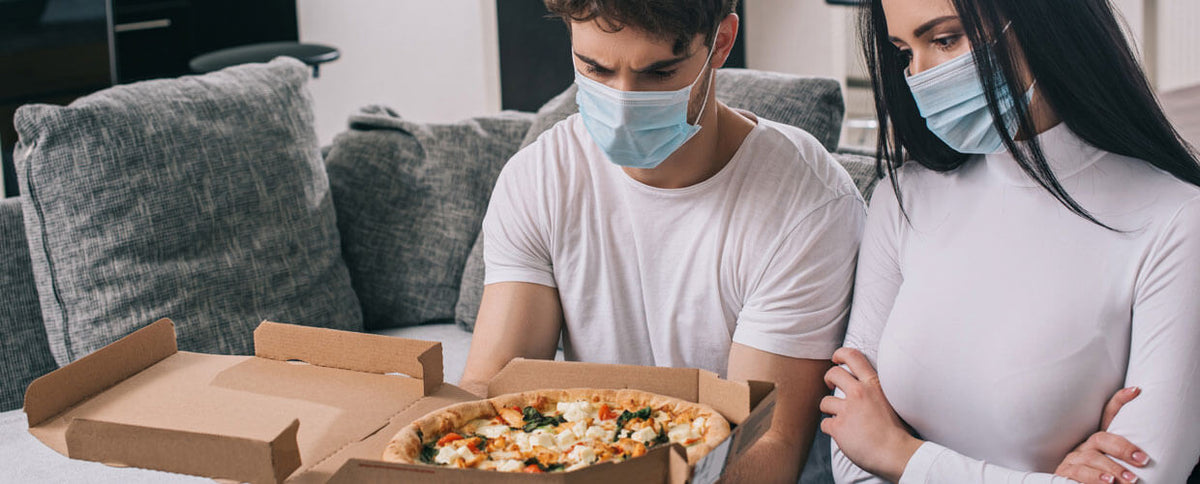6 Tips to Maintain Healthy Eating Habits (When Your Quarantine Partner Eats Like Sh*t)

Even if you're the freakin' Hulk, eating healthy during quarantine isn't easy. COVID-19 has completely changed the way we grocery shop, and therefore, cook, snack and fuel up. Long gone are quick grocery-store runs and fresh-daily produce. Now, getting proper nutrition involves a lot more strategy—and hand sanitizer. Not only do you have to be more mindful with meals and snacks, but it's also tough to cook creatively when your options are limited. Not to mention, if you're sheltering in place with partners or roommates who eat like garbage, it can be even more difficult to maintain your own healthy eating habits. (Pass the... um... popcorn—again?)
As we grapple with the new realities of quarantine, and what this means for our diet, vigilance is key. "Our surroundings, especially our food environment, can have a huge impact on our health and behaviors around nutrition," says Corinna Coffin, Spartan Elite athlete and RD. "You might not be able to change the mentality of others when it comes to their health, but you can take steps to set yourself up for success when it comes to sticking to your own health goals." (Yep, even if you're living on top of each other.)
Even if you've fallen off track, or are finding it difficult to cook healthy meals, don't let Coronavirus set you too far back. We checked in with pro nutritionists for their top tips to eat well during scarce, uncertain times. So reset your nutritional goals, cast temptation aside, and remember: there are no excuses to #BeUnbreakable.
Related: Your Unbreakable Day: 10 Exercises, 10 Life Tips, and 10 Essential Questions Answered
Healthy Eating in Quarantine: Pro Tips to Keep Your Nutrition Dialed
1. Get Support... Or Get a Plan
Any time you're chasing a health goal, a positive support system at home makes the world of a difference in your success. The trick is communicating your endeavors. "Sometimes we make the assumption that our loved ones (family members in particular) are aware of our goals and therefore don't communicate them directly or very clearly," says Coffin. "Sharing our goals with others is oftentimes a critical step in getting the support we need to set ourselves up for success." Tell your partners or roommates that you're trying to stay in line with your nutritional plan, and be clear about your fuel boundaries. (i.e. Which munchies you reach for when you're in yet another late-night Netflix binge.)
Sometimes though, whether it's indifference or fundamental difference, the support just isn't there. While this can make things more challenging, it doesn't have to be the dealbreaker that adds unwanted inches to your waistline. "My biggest recommendation is to go into each day with a nutrition plan," says Coffin. "Far too often, nutrition-related goals are sabotaged by the mentality of 'figuring it out as I go' rather than taking a little extra time to plan out the day ahead with regard to meals and snacks." Look at your schedule ahead of time, and create a meal plan to support it. Take a food inventory and know what ingredients you have on hand. "Without a plan, we are more susceptible to giving in to food cravings and temptations around us, particularly in an environment that doesn't align with our health goals."
Related: Your Unbreakable Day: Badass Supermom, Marine Attempts to BREAK Spartan CEO Joe De Sena
2. Keep Temptation Foods Out of Sight (And Prep Healthy Snacks In Advance)
If your roomies or partners indulge themselves more often than you do, ask them if you can hide unhealthier foods, or put them in a separate dedicated place. "It's hard to focus on healthy foods when surrounded by nutrient-poor options," says Coffin. "This might mean storing certain foods in a specific cabinet or kitchen area so as not to be constantly tempted the moment you get hungry." It's easy to reach for less-healthy food options if they're readily available. Instead, prepare healthy snacks in advance to minimize that habit. Coffin says fresh fruit (as long as it lasts), as well as string cheese, yogurt, cottage cheese, hummus, nuts and seeds are all solid go-tos and take almost zero time to prep.
FROM OUR PARTNER: Get 50% Off Your First 2 Weeks of Fresh Meal Plan, Using Code SPARTAN50
Jim White, RD, ACSM EX-P, and owner of Jim White Fitness & Nutrition Studios, seconds that. Stock your pantry up with healthy snacks so they are easy to grab when the time comes. "If you see a candy dish on the kitchen counter will you be able to stay away from it most of the time? What if a bowl of clementines was there instead?" says White. "Why? We often 'eat with our eyes.' Seeing food is a large power of suggestion influence. If you are going to grab the first thing you see, it may as well be something that fits within your eating plan."
3. Reframe Healthy Eating Into Self Care (And Stick to Your Guns)
In this unprecedented uncertainty, any sense of normalcy can provide comfort and should be leveraged as a form of self care, according to White. For the most part, we can control what we eat—and being ultra mindful right now will serve us better in the long run. "While we are forced to work within the limits of food availability, ultimately we are the decision-makers when it comes to what goes into our mouths," he says. "Sticking as close as possible to your normal diet plan is the best way to feel like you are still in control." And right now, more than ever, a semblance of control = a semblance of comfort. "Of course, it’s often easy to get on board with what everyone else is doing, but remember the old adage, 'if your friend jumps off a bridge…'" says White. "You have to do what’s best for you, not what’s best for or feels right to anyone else." (Bonus: stick to your guns, despite any peer pressure to indulge, and you won’t have to pull off a diet overhaul when this crisis ends.)
Related: Your Unbreakable Day: 25 Minutes of Tabata to Work Your Entire Body
4. Take Charge of Kitchen Patrol
When you're master behind the meal, it's a lot easier to control what you eat. "If you take charge and feed the person who eats like crap, you both benefit," says White. "This puts you in control of your eating habits and takes the influence away from the other person." As you cook, establish easy-to-reach daily benchmarks to ensure you get your micros (i.e. vitamins and minerals) and macros (i.e. protein, fat and carbohydrates). "Set intake goals for nutrient dense foods," suggests White. "Ask yourself, 'Have I had five servings of fruits and vegetables today?' If not, be sure to get that done." Thinking this way refocuses your attention and leaves less room in your appetite for low-nutrient foods.
5. Mind Over Matter—Positive Reinforcement Over Deprivation
Focus on what you should be eating, not on what you shouldn't be eating. "Our minds play a vital role here," says White. "If we choose to focus positive attention on nutrient dense foods they start to become things we look forward to. Also, if we allow ourselves some treats without guilt, we take the wow factor away from them. Cravings will happen. You just need a plan for what you will do when they happen."
For example, curb a craving for chips with carrot sticks and hummus instead. This will take the edge off and work toward your daily veggie quota. Then, if you're still hungry you can have a few chips. (Remember, surviving COVID on a healthy diet is not about complete deprivation, but rather mindful eating.) "Outside influence can be hard. Temptations are real," says White. If your kids reach for the DIY ice cream sundaes after dinner, you can either skip it completely, indulge in a small dish or get creative with a substitute, like White's go-to Greek yogurt topped with berries and dark chocolate chips. "This gives you the experience but also provides more nutrients and less fat and sugar than many traditional desserts. Treats are okay within moderation, especially when planned into your day."
6. Get Back On the Wagon with ONE Measurable Goal
Feel like you've fallen of track, or quarantine eating is just killing your nutrition mojo? White suggests setting one measurable goal to get realigned with where you want to be. "What is the [nutritional piece] that is most important to you? Is it to eat less processed foods? Increase vegetable intake? Drink less soda? Cook more homemade meals instead of ordering takeout? Stop skipping breakfast?" says White. "Decide what matters most to you and put your best efforts into making that one change." Getting clear about your personal deliverables greatly increases your chances of success. "Too often, we realize we’ve gotten off track and simply say, “That’s it, I’m going to clean up my diet!” But, what does that really mean?" says White. "Setting vague goals often leads to disappointment and frustration." Instead, working toward and reaching concrete milestones inspires success, which builds on itself. For example, if you’ve focused on decreasing your soda intake and your new habit sticks, consider that a success. "Now, you can choose something else to work on and feel confident that you will crush it too," says White. "Vegetables with lunch and dinner most days of the week, here you come..."




